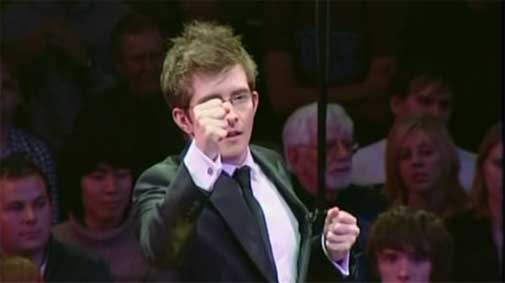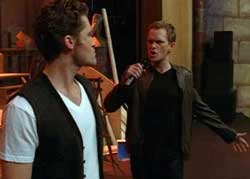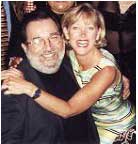
Wednesday night at 10 p.m. ET, BBC America presents the latest installment of The Choir, a fabulous show presenting optimistic choirmaster Gareth Malone (above) and his tireless efforts to introduce music, and music education, to British schools devoid of both.

This Sunday, Fox's Glee is up for a bunch of Emmy awards, and already has picked up one well-deserved statuette, for Neil Patrick Harris' stellar guest turn as an old alumnus of a high-school performing arts program. As an even older alumnus of just such a program, I'm a sucker for both these shows...
What Glee does, week in and week out (for now, Fox is double-pumping reruns of the musical series to fill its Tuesday prime-time summer schedule), is present both the joy and passion of music and the wildly individual characters represented in any sort of artistic high-school endeavor. It;s scripted, but it works.
And what The Choir does, each week, is show the real thing: Youngsters -- some introverted but talented, others outgoing but hostile -- being herded into a coherent unit, making music that inspires not only them, but their parents and friends. And, I promise, anyone who tunes in.
Both shows have an overt message that I hope is being absorbed, even if subliminally: That music education programs, at the high-school and even grade-school level, are things to be thought of not as expendable frivolities, but as educational necessities. Copies of The Choir should be sent to every school board in America. So should copies of a newspaper article written by a friend of mine more than a decade ago -- an article that, unfortunately, still rings just as true.
Ray Recchi was my boss and mentor when I got to the Ft. Lauderdale News in 1977, the guy who taught me how to find my voice as a columnist -- and, perhaps no less important, how to walk through a newsroom with a full cup of coffee without spilling any. (Never look at it. It works.)
By the time I left that paper in 1980, Ray had "demoted" himself to columnist to enjoy life more, we had become close friends, and the paper itself had become the Sun-Sentinel. Ray died more than a decade ago, but one of his columns just resurfaced.

It was recirculated on the email forum of the Hall/Hill Performing Arts, the South Florida Glee-ish group of which I once was a member (mostly offstage, blessedly, as lighting designer and such), whose home website, run by surviving teacher Allen Hill, can be found HERE.
When I read that article, it made me miss Ray (seen here with Buffie Blakeslee Peter, one of the youngest members of our company when we first started staging musicals at Nova High School), and envy his breezy writing style, all over again. But it also made me think of The Choir, and Glee, and the sorry state of most music education today.
Which is why I'm happy -- honored -- to reprint it here. Thanks, Ray...
Music Is Not Dessert
By RAY RECCHI, Lifestyle Columnist, Fort Lauderdale, Florida
For me, music has never been dessert. It has always been one of the main courses.
I wake up to music, listen to it as I drive to work and hum while I'm working. Even when I'm silent, a melody is running through my head. (At the moment, it is a Scott Joplin rag, for reasons unknown even to me.)
My father made his living as a musician. It also was his hobby. For years, I made my living writing about music, which was my hobby, too. All three of my children play musical instruments and spend a lot of time making and listening to music. I'm proud of that.
Even for those whose lives are less involved with it, however, music is not merely something pleasant to listen to while driving, shopping or jogging, although it fulfills those purposes. It is humanizing. It is a form of communication that brings people together in a way that can transcend words, races, religions and ideologies.
And the more you know about it, the more beautiful it is -- not just the sound of it, but the structure of it, indeed the very idea of it.
What's more, one cannot seriously study music without learning about math, languages, history, anthropology and several other subjects. A music student also learns self-discipline, responsibility and dedication.
So it confounds and angers me that whenever we need to put the education budget on a diet, people regard music as dessert instead of the healthy main course that it is.
And with all the talk of budget cuts in education these days, you can't blame music teachers for feeling a bit paranoid.
In an effort to blunt the expected assault on music programs, the theme of the Florida Music Educations Association convention in Tampa last weekend was "Music makes the difference." The group's message was that music is not a frill, but is basic to education.
Obviously, many would argue with that. The philosophy of the "no frills" faction is that math, science, English and history are the only basics. The arts, they say, are extras.
I can't help but think, however, that if music were simply to disappear, those people might change their tune. Fortunately, that won't happen. Music and the people who make and teach it will go on in spite of all those who have little or no respect for them.
Ironically, that is also the problem. Music is such a big part of our lives that people tend to take it for granted. Because part of the beauty of music is that, even though it is a main course, it tastes like dessert.